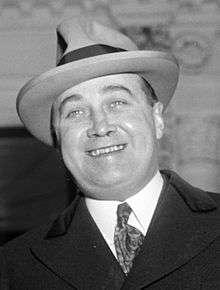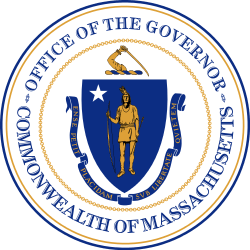Paul A. Dever
| Paul A. Dever | |
|---|---|
 1939 photograph by Harris and Ewing | |
| 58th Governor of Massachusetts | |
|
In office January 6, 1949 – January 8, 1953 | |
| Lieutenant | Charles F. Sullivan |
| Preceded by | Robert F. Bradford |
| Succeeded by | Christian A. Herter |
| 32nd Massachusetts Attorney General | |
|
In office 1935–1941 | |
| Preceded by | Joseph E. Warner |
| Succeeded by | Robert T. Bushnell |
| Member of the Massachusetts House of Representatives | |
|
In office 1929–1935 | |
| Personal details | |
| Born |
Paul Andrew Dever January 15, 1903 Boston, Massachusetts |
| Died |
April 11, 1958 (aged 55) Boston, Massachusetts |
| Political party | Democratic |
| Spouse(s) | None |
Paul Andrew Dever (January 15, 1903 – April 11, 1958) was a Democratic politician from Boston, Massachusetts. He served as the 58th Governor of Massachusetts and was its youngest-ever Attorney General.
Early life
Paul Dever was born in Boston, Massachusetts to two Irish immigrants, Joseph and Anna MacAlevy Dever. He attended Boston public schools, including Boston Latin School. He attended Northeastern University for a time, but then transferred to Boston University, from whose law school he graduated with an LL.B. in 1926[1] with high honors.
Dever was elected to the Massachusetts House of Representatives in 1928, and served from 1929 to 1935. In 1934 he was elected Attorney General, and was at age 31 the youngest to hold that office. In 1940, he challenged popular incumbent Governor Leverett Saltonstall, losing by a narrow margin.
World War II
In 1942, Dever enlisted in the United States Navy for World War II. He was subsequently commissioned a Lieutenant Commander, and served in the North Atlantic, European and African Sectors until his discharge at the end of the war in 1945.
Return to politics
Dever lost the 1946 race for lieutenant governor, but two years later he defeated incumbent governor Robert F. Bradford by a substantial margin in the race for Governor, and became the 58th Governor. He was re-elected in 1950, defeating the Republican candidate, former Lieutenant Governor Arthur W. Coolidge.
During his tenure, Dever increased state aid to schools and issued an executive order to extend higher education benefits to Korean War veterans. Among his chief concerns were civil defense and resisting domestic communism. He supported legislation requiring school teachers to take loyalty oaths, and he advocated increasing old age and workers compensation insurance.
In 1952, Dever made an unsuccessful bid for the Democratic presidential nomination. Later that year the Dever administration came under fire when the Massachusetts Federation of Taxpayers Associations found that pensions for members and former members of the state legislature had been increased. One of those eligible was former Mayor of Boston and Governor James Michael Curley, a convicted felon. Dever gave in to pressure groups, calling a special session of the legislature that repealed the bill. Although Dever had built a strong political machine in Massachusetts, he was narrowly defeated for re-election by Christian Herter in 1952.
Death and burial
After leaving office Dever returned to practicing law. He suffered from heart disease in his later years, and died of a heart attack on April 11, 1958. He was buried in St. Joseph Cemetery in the West Roxbury section of Boston.
After Dever's death, the Myles Standish State School for the Mentally Retarded was renamed the Paul A. Dever State School in his honor.
Notes
- ↑ Hannan, p. 110
Sources
- Hannan, Caryn, ed. (2008). Massachusetts Biographical Dictionary. Hamburg, MI: State History Publications. ISBN 9781878592668. OCLC 198759744.
| Political offices | ||
|---|---|---|
| Preceded by Joseph E. Warner |
Massachusetts Attorney General 1935–1941 |
Succeeded by Robert T. Bushnell |
| Preceded by Robert F. Bradford |
Governor of Massachusetts January 6, 1949 - January 8, 1953 |
Succeeded by Christian Herter |
